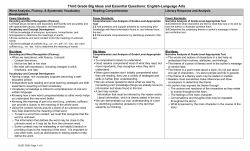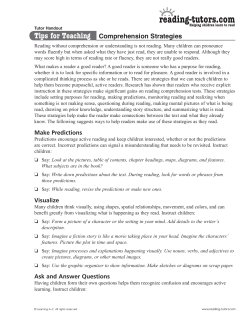
Document 66630
Secondary Research No Child Left Behind initiatives support the use of secondary research as well as primary research. In addition to Learning Ally’s ongoing primary research studies, we use secondary sources to inform and shape The Benefits of Audiobooks in Teaching our programs. The articles cited appear in well-respected journals and online sources that document the effectiveness of audiobooks for students with print disabilities. THE CHALLENGE THE CHALLENGE Citing studies by experts in the field, Lubliner (2004) Archer, et al. (2003) have determined that a student’s concludes that proficient reading requires children to failure to develop the skills necessary to read text decode and comprehend simultaneously as they move accurately has a negative impact on both their current through a text. In addition, children’s capacity to hold and future reading skill development. The immediate information in memory is very limited and in the initial effect is that the student will have limited or no stages of reading, decoding requires nearly all of their comprehension of the content because he can not cognitive resources. They are then unable to focus on correctly decode the words; which is the first step in comprehension. Struggling readers, who have failed to building reading comprehension. As the student develop automatic, proficient skills continue to switch progresses through school, the content becomes more back and forth from decoding to comprehension. This complex and dense with more and more challenging process becomes increasingly difficult and ineffective terminology. If the student did not develop effective as text demands accelerate and reading skills remain decoding skills, he will not be able to comprehend the static. In other words, students cannot comprehend content. This could lead to serious frustration and what they cannot read, and reading is a skill that takes possible academic failure. The result is that students time and effort. with reading challenges are: Lubliner, Shira. Help for Struggling Upper-Grade Elementary Readers. The Reading Teacher, Vol. 57, 2004. • More likely to struggle in secondary coursework. offering 75,000+ titles. We provide digitally recorded • More likely to drop out of school when given the textbooks and other support materials to over tens of children in mind that are not only educational but thousands of members who cannot effectively read very entertaining. These types of audiobooks make Learning Ally provides access to the context auditorily so that the learner can focus on the content and not the decoding. Dyslexic , is the nation’s largest audio textbook library ® standard print because of a visual impairment, learning • Less able to obtain employment that supports disability or other physical disability. themselves and their families as adults. To answer educators’ questions about the results of • More likely to have social/emotional challenges as adults. “ The single most important activity for building the knowledge required for eventual success in reading is ” reading aloud to children. Anderson, R., Hiebert, E., Scott, J., & Wilkinson, I. (1984). Becoming a nation of readers. ChampaignUrbana, IL: Center for the Study of Reading. Research shows that Learning Ally’s program helps students gain confidence, independence and success. Learning Ally, formerly Recording for the Blind & first opportunity. THE SOLUTION A Research Brief our programs and to address the requirements of the • Less able to participate in post-high school education No Child Left Behind legislation, we commissioned training programs at technical schools, community scientifically based primary research and case colleges, colleges and universities. studies, and probed secondary sources to evaluate Archer, Anita L, Mary M. Gleason, Vicky L. Vachon. Decoding and Fluency: Foundation Skills for Struggling Older Readers, Learning Disability Quarterly, Vol. 26, 2003. student achievement. This report summarizes several research initiatives and case studies, as well as secondary source findings to THE SOLUTION support the benefits of our organization. Learning Ally’s research indicates that audiobooks challenges described above. 20 Roszel Road, Princeton, New Jersey 08540 them “variety.” 2. There are specific audiobooks prepared with learning fun. 3. Using audiobooks to teach children in school can give teachers more time to prepare for the next lesson. 4. Children with reading challenges can follow the readings from audiobooks while looking at the printed material and increasing their learning skills. 5. Audiobooks are cost effective compared to other technologies. 6. Audiobooks of popular stories hold students’ interest. 7. Some students prefer to “read” by listening. pronunciation of certain words that they would leading to improved comprehension — addressing the 800.221.4792 1. Using audiobooks to teach children in school gives 8. Audiobooks help children decipher the proper improve student decoding and fluency skills, thus ©2012 Learning Ally, Inc. All rights reserved. Learning Ally™, Making reading accessible for all™, the “Access” icon, Recording for the Blind & Dyslexic® and all trademarks and service marks are owned by Learning Ally, Inc. Benefits of Using Audiobooks LearningAlly.org 800.221.4792 09/12 LearningAlly.org have difficulty reading. By hearing the pronunciation and seeing it in print, they grasp it better. Lilly, S. 8 Teaching Benefits of Audio Books. EzineArticles. http://ezinearticles.com/?8-Teaching-Benefits-of-AudioBooks&id=384636. December 12, 2006 Primary Research Program Evaluation Evaluating the Effectiveness of Learning Ally’s Audiobooks on CD in Conjunction with RAVE-O, a Comprehensive Reading Intervention Implementing Learning Ally’s Learning Program: Evaluating the Impact on Classroom Procedures Center for Reading and Language Research, Tufts University, 2004, 2005, 2006 Center for Technology in Education (CTE) and Education Association, Inc. (EAI), Johns Hopkins University, 2006 RESULTS: Students demonstrated statistically significant increases in standard scores in the areas of listening comprehension, phonological analysis, and blending and reading comprehension. ANALYSIS OF READING SKILLS Specific analysis according to severity of the reading problem and Learning Ally’s intervention are as follows: • Students listening to audio versions of the minute stories while reading the text showed significant gains in listening comprehension, blending sounds and reading comprehension. THE STUDY AT A GLANCE: A total of 85 students identified as struggling CASE STUDY: Rural County in Maryland, Grades 2-8, readers, ranging in grades 1-4 participated over the Language Arts/English 2005-2006 course of three summers. The treatment groups for the study are as follows: • Students reading along and listening to audio versions of the minute stories for 10 minutes a day. • Students reading along and listening to audio and listening comprehension. • Students in the accelerated listening groups • 15 students participated in a year-long study. • Participating students had Individual Education Plans (IEPs) with reading goals. RESULTS: Teachers and parents were surveyed and interviewed at the beginning and at the end of the • Participating students were identified as evaluation. The results were: having strength in listening comprehension. • CTE & Learning Ally provided structured Teachers: versions of the minute stories for 10 minutes a day, • The Learning Ally equipment is easy to use. at an accelerated rate. • The Learning Ally materials and equipment professional development to teachers for integrating Learning Ally into the classroom. • Results were measured by participant surveys, support instruction. • Students not using audio input. classroom observations, end-of-year focus • There are no barriers or obstacles to equipment • Students with severe reading impairments showed significant increases in phonetic skills THE STUDY AT A GLANCE: groups, teacher implementation logs and use (when equipment and implementation training SIGNIFICANT OUTCOMES student achievement data. is provided). Researchers, concluded that: “Over the course of three summer studies, integrating Learning Ally’s audiobooks • Learning Ally promotes independence among students. SIGNIFICANT OUTCOMES demonstrated significant increases in phonological on CD with the RAVE-O minute stories led to significant skills, listening and reading comprehension. increases in students’ phonetic skills, listening and the attention of struggling readers that would In their study summary, researchers reported the reading comprehension and fluency. These results were simply “tune out” of lessons in the past. following teacher comments: •Students identified as struggling readers showed significant gains in reading fluency and accuracy. RESEARCHER: especially encouraging as the intervention took place for such a short period of time (approx. 4 weeks).” (Wolf, 2006) • The audiobooks were able to motivate and hold Parents: • Parents reported their children were satisfied with and Language Research, Tufts University hearing the stories, he was able to actively and • Parents were very satisfied that Learning Ally helped their children access text materials. Maryanne Wolf, Ed.D., Director, Center for Reading • “My student struggles with word recognition, so by successfully participate.” • “In order for my student to ‘read’ grade-level text, she needs to listen to the Learning Ally CDs. Her Learning Ally’s audiobooks and playback equipment. comprehension is very good; she just struggles with decoding.” • Parents reported the following improvements in their “ There’s no better tool than audiobooks for special education — ESL, At-Risk, inclusion, remedial, Title I. Pronunciations, speech patterns, image correlation and content comprehension are greatly improved by hearing at the same time as seeing. Special needs students are excited to hear their first books — often understanding for the first time what a joy books can be. And using audiobooks as a classroom activity means remedial readers aren’t singled out for special classes, but can stay and learn with ” others. Being ‘included’ can’t help but build confidence and much-needed self-esteem. The Audio Bookshelf. Learning with Audiobooks. 1997. https://www.audiobookshelf.com/teachwith.html. child’s reading skills: • “I had a student who was failing the first quarter … One •B etter understanding of what they were reading (comprehension). •B etter understanding of the words they read (decoding). • Greater ease and smoother reading (fluency). RESEARCHERS: Center for Technology in Education (CTE) and Education Association, Inc. (EAI), Johns Hopkins University accommodation was to use the Learning Ally machine before he took a summative response on the material. He went from failing every subject at the start of the year to passing every subject by the end of the school year (A,B, C grades in all subjects). He passed on his own.”
© Copyright 2025















